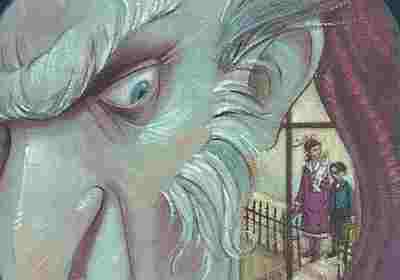The series book I chose to read was The Bad Beginning, which is the first book the Series of Unfortunate Events by Lemony Snicket. The book is centered around three children who have just become orphaned. Violet, Klaus, and Sunny Baudelaire are incredibly wealthy and incredibly unlucky. Though the children are all rather intelligent, they can not seem to catch a break, despite finding their way through many sticky situations. One bad occurrence happens after another, no thanks to the evil Count Olaf. Count Olaf is the main protagonist of the book and is trying to steal the Baudelaire fortune, even if it means harming three young children. Despite the children being well off, they are do not act spoiled, yet people still assume that they must be conceited because they come from money. This is a common idea a lot of people have about children, I believe. Some people want to assume that children who come from a wealthier background are full of themselves, though this is rarely a case. We also see the children in this book having their intelligence constantly in question. I believe the author wanted to make the point that children can be very smart and do not need someone to always explain situations to them. A lot of children are perfectly capable of solving problems and dealing with things on their own. This does not mean we should not help children, but we should never belittle them or question their intellectual capability. I think that students who can connect with the characters would greatly enjoy this book. It is very powerful that the young girl, Violet, is into science and inventing things, and I feel that young girls also interested in the sciences would like this book for that reason. This series would also be great for students who like to read a lot because there are thirteen total books. It would be able to entertain young readers for quite some time. Really any child who likes books with a good twist and lots of excitement would likely be pulled in this series.
A really great resource for this series would be the Lemony Snicket website. On this website one can find lots of different activities, trivia, and other things to expand students’ knowledge on the book. I don’t feel like I would choose this book or series as something for the whole class to read together, simply because it is rather dark throughout. I would not want children to have to read something like that if they did not choose to themselves because there is really no happy ending. However, I would make this book available in my classroom and recommend it for those that do enjoy a good, long read and challenge to their vocabulary. This series uses a great deal of big words, but provides good definitions for those words, which can help expand a young reader’s vocabulary.
Changing subjects, Donalyn Miller made a point to discuss many different types of readers and how different environments influence these readers in her book Reading in the Wild. A lot of students felt that they read best or did the most reading in the classroom. A common theme with these students was that it was quiet and everyone else was reading so they could, too. A couple of students even discussed how they did not have trouble finding a place to read, as long as the book they were reading as good. This is the type of reader I see myself as. If I really enjoy a book, I could read anywhere and have no trouble putting all the distractions to the side. However, if the book is not something I particularly enjoy or something I have to read for a class, then I need to be somewhere quiet where I can really focus on what it is that I am reading. Miller also discussed that we can find many different times to read in little open time slots in our day, like waiting for a doctor’s appointment, at a sibling’s sports game, or waiting for a movie to start. I really liked what Miller had to say about “fake readers”, as well. There are a lot of different factors that go into what could make someone feel the need to fake read. A big part of it is likely that these student struggle to find a book that can hold their interest and need assistance in finding books that they enjoy and can finish. This is something I think I may find challenging and I am a little afraid of. I know that I don’t have a great enough knowledge about children’s books to recommend books for students, especially those who finding difficult. I have a fear that a child is going to ask me for my help and I won’t know how to help them. However, this also gives me the motivation to learn about more children’s book and expand my knowledge on them, and this is something I get to be excited about. Someday I will get to pass on my love of reading for oneself to my future students.




